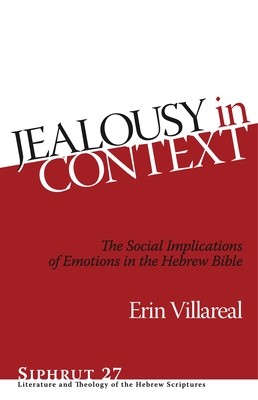
- We will send in 10–14 business days.
- Author: Erin Villareal
- Publisher: Eisenbrauns
- ISBN-10: 1575067366
- ISBN-13: 9781575067360
- Format: 15.2 x 22.9 x 1.8 cm, kieti viršeliai
- Language: English
- SAVE -10% with code: EXTRA
Reviews
Description
Attested as both a human and a divine expression, the biblical Hebrew term qinʾâ is most often translated as "jealousy" or "envy." In this study, Erin Villareal makes the case for reading qinʾâ as more than a simple reference to an emotion, instead locating the term's origins in ancient Israel's social and legal spheres.
Jealousy in Context evaluates the socioliterary context of qinʾâ. Through a series of case studies examining this term as it is applied to residents, sister-wives, brothers, and husbands in biblical narrative passages, Villareal explains that qinʾâ is felt by people who experience a threat or disruption to their rights and status within a social arrangement or community and is therefore grounded in practical concerns that have social and juridical ramifications. Investigating examples of divine qinʾâ, Villareal shows that its social meaning was adapted into theological language about the Israelite deity and his relationship with the people of Israel, and that Yahweh expresses qinʾâ whenever there is a threat to the integrity of his land or his sanctuary. Villareal examines the term through this socioliterary lens to reveal ancient Israelite perceptions concerning social organization and divine-human relationships. Additionally, she explores how the socioliterary character of qinʾâ in the Hebrew Bible communicates representations of ancient Israelite beliefs, values, and social expectations.
This convincing new understanding of a key biblical term will be appreciated by students and scholars of the Hebrew Bible, Hebrew linguistics, and ancient Near Eastern societies more generally.
EXTRA 10 % discount with code: EXTRA
The promotion ends in 22d.10:32:13
The discount code is valid when purchasing from 10 €. Discounts do not stack.
- Author: Erin Villareal
- Publisher: Eisenbrauns
- ISBN-10: 1575067366
- ISBN-13: 9781575067360
- Format: 15.2 x 22.9 x 1.8 cm, kieti viršeliai
- Language: English English
Attested as both a human and a divine expression, the biblical Hebrew term qinʾâ is most often translated as "jealousy" or "envy." In this study, Erin Villareal makes the case for reading qinʾâ as more than a simple reference to an emotion, instead locating the term's origins in ancient Israel's social and legal spheres.
Jealousy in Context evaluates the socioliterary context of qinʾâ. Through a series of case studies examining this term as it is applied to residents, sister-wives, brothers, and husbands in biblical narrative passages, Villareal explains that qinʾâ is felt by people who experience a threat or disruption to their rights and status within a social arrangement or community and is therefore grounded in practical concerns that have social and juridical ramifications. Investigating examples of divine qinʾâ, Villareal shows that its social meaning was adapted into theological language about the Israelite deity and his relationship with the people of Israel, and that Yahweh expresses qinʾâ whenever there is a threat to the integrity of his land or his sanctuary. Villareal examines the term through this socioliterary lens to reveal ancient Israelite perceptions concerning social organization and divine-human relationships. Additionally, she explores how the socioliterary character of qinʾâ in the Hebrew Bible communicates representations of ancient Israelite beliefs, values, and social expectations.
This convincing new understanding of a key biblical term will be appreciated by students and scholars of the Hebrew Bible, Hebrew linguistics, and ancient Near Eastern societies more generally.


Reviews